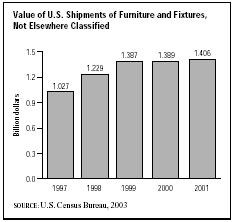SIC 2599
FURNITURE AND FIXTURES, NOT ELSEWHERE CLASSIFIED
This classification covers establishments primarily engaged in manufacturing furniture and fixtures, not elsewhere classified, including hospital beds and furniture specially designed for use in restaurants, bars, cafeterias, bowling centers, and ships.
NAICS Code(s)
339113 (Surgical Appliance and Supplies Manufacturing)
337127 (Institutional Furniture Manufacturing)
According to the U.S. Census Bureau, more than 700 establishments make products in this classification. In 2001, they shipped $1.4 billion worth of goods, spent $627 million on materials, and paid $58 million for buildings and other structures, machinery, and equipment. Furniture and fixtures, not elsewhere classified, accounted for 31.4 percent of total institutional furniture industry shipments ($4.4 billion) in 2001.
The manufacturing of furniture and fixtures in this category primarily arose to fill specific needs within the service industry market. For instance, after World War II, the rise of bowling as a recreational sport necessitated the construction of a plethora of alleys across the United States to satisfy a growing demand. The factories and manufacturing plants that were built across the country needed specific interior furniture for a wide variety of purposes also, so this industry filled the needs of the growing industrial economy of the United States. Later, as orders for factory furniture declined due to the drop in

overall manufacturing, the furniture and fixtures industry accommodated other segments of the economy. Hospital furniture manufacturing firms met the increased demand for new beds as medical facilities were built to serve more populous suburban communities. The growing consumer willingness to spend more entertainment dollars on dining out during the 1970s and 1980s fueled the construction of restaurants and the corresponding need for sturdy yet attractive furniture to fill them.
Nearly half of the industry's shipments are miscellaneous commercial products such as furniture for bowling alleys, factories, and ships, followed by commercial foodservice fixtures and hospital beds. Shipments in this industry grew 66 percent between 1985 and 1995. The value of shipments continued to grow steadily throughout the late 1990s and early 2000s, from $1.027 billion in 1997, to $1.229 billion in 1998, to $1.387 billion in 1999, to $1.389 billion in 2000, and to $1.406 billion in 2001. This growth took place despite difficult economic conditions in the United States.
California, Tennessee, and Missouri had the highest value of goods shipped for this industry. Arkansas, Florida, Illinois, Massachusetts, Michigan, Minnesota, and Wisconsin also ship large amounts of merchandise in this classification.
Kinetic Concepts Inc. (San Antonio, Texas) was the largest company primarily engaged in the production of furniture and fixtures in this category. This hospital bed manufacturer had 2,100 employees and $763.8 million in revenues in 2003, up considerably from $270 million in 1996 and $278 million in 1992. The firm announced its intent to conduct an initial public offering in 2004.
Hill-Rom Inc., a subsidiary of Hillenbrand Industries Inc. (Batesville, Indiana), was another leading hospital bed firm, and it claimed top sales in the electrically powered bed category. Hill-Rom employed approximately 3,700 people and posted sales of $1.06 billion in 2003. Hillenbrand had 9,900 employees and sales of $2.04 billion in 2003. In the mid-1990s Kinetic Concepts and Hill-Rom each filed antitrust charges with the U.S. Department of Justice. Kinetic Concepts accused Hill-Rom of attempting to monopolize the hospital bed market, and Hill-Rom countered by alleging that Kinetic Concepts was trying to monopolize the therapeutic bed market. In September of 2002, a jury found in favor of Kinetic Concepts, ordering Hill-Rom to pay $173.6 million in damages. Hill-Rom announced plans to appeal the verdict.
Other large companies competing in this industry included Restoration Hardware Inc. (Corte Madera, California), with sales of $438.5 million and 3,500 employees in 2004; Invacare Corp. (Elyria, Ohio), with sales of $1.2 billion and 5,300 employees in 2003; Kimball International Inc. (Jasper, Indiana), with sales of $1.15 million and 8,005 employees in 2003; Shelby Williams Industries Inc. (Morristown, Tennessee), a subsidiary of Falcon Products Inc. (St. Louis, Missouri), with sales of $251 million and 1,980 employees in 2003; and privately owned Sunrise Medical Inc. (Carlsbad, California).
According to recent figures available from the U.S. Census Bureau in 2000, more than 22,000 people were employed in this industry, including more than 16,000 production workers who earned an average hourly wage of $11.50.
Further Reading
Falcon Products, Inc. Annual Report. St. Louis, MO, 2003.
Hillenbrand Industries, Inc. Annual Report. Batesville, IN, 2003.
Kimball International, Inc. Annual Report. Jasper, IN, 2003.
Kinetic Concepts, Inc. Annual Report. San Antonio, TX, 2003.
Shelby Williams Industries, Inc. Annual Report. Chicago, 2003.
U.S. Census Bureau. "Statistics for Industry Groups and Industries: 2000." February 2002. Available from http://www.census.gov/prod/2002pubs/m00as-1.pdf .
——. "Value of Shipment for Product Classes: 2001 and Earlier Years." December 2002. Available from http://www.census.gov/prod/2003pubs/m01as-2.pdf .
Comment about this article, ask questions, or add new information about this topic: